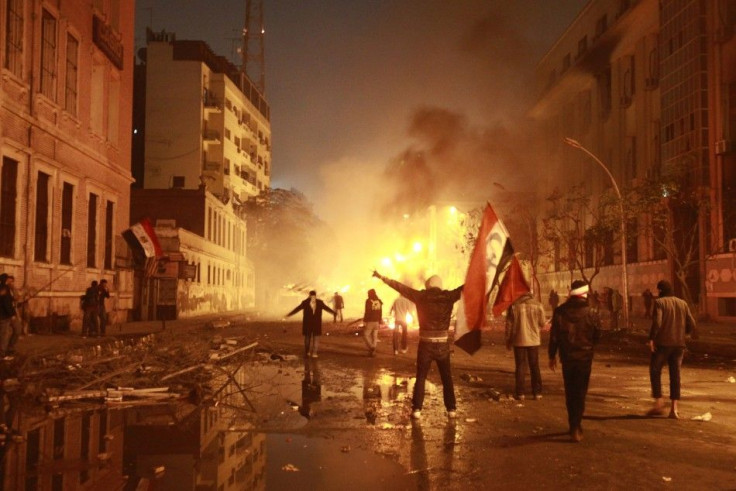Egyptians Enraged by Soccer Deaths Besiege Interior Ministry

(Reuters) - Protesters laid siege to Egypt's Interior Ministry Friday, extending a rally against the military-led government into a second day in a show of anger triggered by the deaths of 74 people in the country's worst ever soccer disaster.
Several thousand demonstrators remained in the streets around the ministry in Cairo as night fell. For the most part, the only vehicles in the usually congested downtown area were ambulances that ferried away casualties from clashes with police.
Underlining the tension, ambulances had to intervene to extract riot police whose truck took a wrong turn into a street full of protesters, a Reuters witness said.
Protesters surrounded the vehicle for at least 45 minutes, rocking it while the police were inside. Some of the demonstrators then formed a human corridor to help them escape.
Close to 400 people were wounded in confrontations that erupted late Thursday, the Health Ministry said, many of them suffering the effects of inhaling tear gas fired by riot police who the Interior Ministry said were protecting the building.
Rocks thrown by protesters were strewn across streets that two months ago witnessed lethal clashes between police and activists who see the Interior Ministry as an unreformed vestige of former President Hosni Mubarak's rule.
The latest protests were triggered by Wednesday's deaths at a soccer stadium in Port Said. Demonstrators who took to the streets Thursday, many of them soccer fans, held the military-led authorities responsible for the bloodshed.
We are not going to leave this time, said Sami Adel, a 23-year old member of the Ultras, a group of football fans known for confronting police. They have regularly been on the front lines of clashes with security forces over the last year.
Security forces fired tear gas into the night to drive back protesters, who then regrouped ready for more. The crimes committed against the revolutionary forces will not stop the revolution or scare the revolutionaries, said a pamphlet printed in the name of the Ultras that was being handed out.
The soccer stadium deaths have heaped new criticism on the military council, which has governed Egypt since Mubarak stepped down a year ago in the face of mass protests.
Their critics regard the generals as part of his administration and an obstacle to change.
The army leadership, in turn, has presented itself as the guardian of the January 25 revolution. It has promised to hand power to an elected president by the end of June.
INTERIOR MINISTER BLAMES FANS
At least 1,000 people were injured in the soccer violence when fans invaded the pitch after local team al-Masry beat Cairo-based Al-Ahly, the most successful club in Africa.
Hundreds of al-Masry supporters surged across the pitch to the visitors' end and panicked Ahly fans dashed for the exit. But the steel doors were bolted shut and dozens were crushed to death in the stampede, witnesses said.
The cause of the violence has been the focus of intense speculation. Some believe it was triggered by unknown provocateurs working for remnants of the Mubarak administration who are seeking to sabotage the transition to democracy.
Interior Minister Mohamed Ibrahim said the fans started it.
The events started with provocations between the Ahly and Masry crowds, then insults, until it ended up with those sorrowful events, he told the Egyptian TV station CBC during a telephone interview.
Ibrahim was widely blamed for the deaths during an emergency parliamentary session Thursday. MPs including the Islamists who control some 70 percent of the chamber called for him to be held to account and accused him of negligence.
Safwat Zayat, an analyst, said the incident had done further damage to the image of the ruling military council. The current events push in the direction of speeding up the transfer of power to civilians, Zayat told Reuters.
Field Marshal Mohamed Hussein Tantawi, the head of the military council, responded to the deaths by vowing that Egypt would remain stable. We have a roadmap to transfer power to elected civilians, he said in broadcast remarks.
(Additional reporting by Ashraf Fahim and Ahmed Tolba; Writing by Tom Perry; Editing by Mark Heinrich)
© Copyright Thomson Reuters 2024. All rights reserved.




















